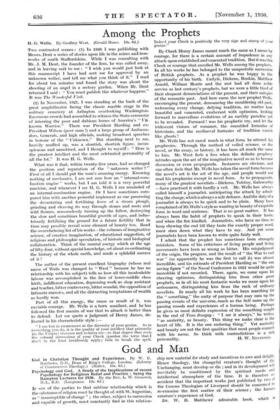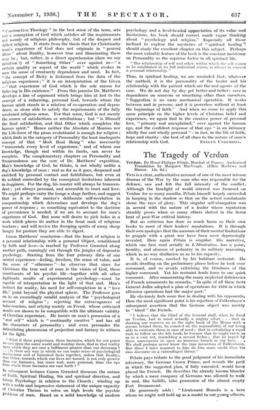God a
nd Man Psychology and God. A Study of the Implications of recent Psychology for Religious Belief and Practice : being the Hampton Lectures for 1930. By the Rev. L. W. Grensted, M.A., B.D. (Longmans. 10e. gd.) IF one of the parties to that sublime relationship which is the substance of religion must be thought of, with St. Augustine, as " insusceptible of change " ; the other, subject to succession and capable of growth, must constantly fmd in this relation- ship new material for study and incentives to awe and delight. Hence theology, the changeful creature's thought of the Unchanging, must develop or die ; and in its development 1611 inevitably be conditioned by the spiritual needs and intellectual atmosphere of the time. It is therefore no accident that the important works just published by two of the Canons Theologian of Liverpool should be concerned to re-examine the first matter of their science ; the human creature's experience of God.
Dr. W. R. Matthews' admirable book, which is
" Constructive Theology " in the best sense of the term, sets out a conception of God which satisfies all the requirements not merely of religious philosophy, but of the deepest and fullest religion. It starts from the thesis that for Christianity man's experience of God does not originate in " general ideas " about Reality, however true and illuminating these may be ; but, rather, in a direct apprehension (dare we say intuition ?) of " Something Other " over against us—" a certain quality or aspect of the world " which evokes in men the sense of creaturely dependence and need. In fact. " the concept of Deity is fashioned from the data of the religious experience ; " it is an interpretation of the Given —" that experience of God which is the sole reason for believing in His existence." From this premise Dr. Matthews develops a line of argument which brings him at last to the concept of a redeeming, personal God, towards whom the human spirit stands in a relation of co-operation and depen- dence, as alone able to satisfy the requirements of the fully awakened religious sense. For that sense, God is not merely the source of satisfactions or retributions ; but " is Himself the final satisfaction, and that Other which completes the human spirit." Hence neither the Absolute of Monism nor the Life-force of the pious evolutionist is enough for religion ; which finds in the category of Personality the least inadequate concept of that " Most Real Being " who necessarily " transcends every level of experience," and of whom our knowledge, though real within its limits, can never be complete. The complementary chapters on Personality and Transcendence are the core of Dr. Matthews' exposition. Man's knowledge of God, he thinks, is not wholly unlike a dog's knowledge of man : real as far as it goes, deepened and enriched by personal contact and faithfulness, but even at its noblest controlled by the conceptual limitations inherent in Bogginess. For the dog, his master will always be transcen- dent; yet always personal, and accessible to trust and love. We might perhaps carry the image a stage further, and suggest that as it is the master's deliberate self-revelation in companionship which determines and develops the dog's power of response ; so something equivalent to the doctrine of prevenience is needed, if we are to account for man's experience of God. But none will desire to pick holes in a work which places its author in the front rank of religious teachers ; and will revive the drooping spirits of many sheep hungry for pasture they are able to digest.
Canon Matthews' conclusion—that the heart of religion is a personal relationship with a personal Object, conditioned by faith and love—is reached by Professor Grensted along another path, cunningly cut through the jungles of dogmatic psychology. Starting from the four primary data of our mental experience—feeling, freedom, the sense of value, and the sense of " otherness "—he observes that since for Christians the true end of man is the vision of God, these constituents of his psychic life—together with all other legitimate results of experimental psychology—must be capable of interpretation in the light of that end. Man's instinct for reality, his need for self-completion in a " love life," point beyond the physical sphere. The Professor goes on to an exceedingly candid analysis of the " psychological account of religion " ; rejecting the extravagances of behaviourism, and relying mainly on Freud, whose criticized results are shown to be compatible with the ultimate validity of Christian experience. He insists on man's possession of a " real self " which is " continually creative " and has all the characters of personality ; and even persuades the Intimidating phenomena of projection and fantasy to witness for the light.
" What if these projections, these fantasies, which for our peace we cast upon the outer world and worship there, find in that reality upon which they are cast a fulfilment greater than our dreaming ?
• . . Is there any way in which we can make sense of psychological mechanisms and of historical facts together, unless that Reality, that Other, towards which our lives are turned, is not only greater than our fantasies, but more real, more personal, than the ego
from which those fantasies are cast ? "
In subsequent lectures Canon Grensted discusses the nature of Faith, Spiritual Healing, Sin and spiritual direction, and Group Psychology in relation to the Church ; winding up with a noble and impressive statement of the unique capacity of Christian Theism to solve on high levels the psychic problems of man. Based on a solid knowledge of modern psychology and a level-headed appreciation of its value and limitations, his book should correct much vague thinking about " psychology and religion." Especially all those inclined to explore the mysteries of " spiritual healing 1 should study the excellent chapter on this subject. Perhaps the most valuable feature of the book is the constant insistence on Personality as the supreme factor in all spiritual life.
" The relationship of self and other, within whirls the self comes to be established in its full individual status, is always in essence a personal relationship."
Thus, in spiritual healing, we are reminded that, whatever the method, it is the personality of the healer and his relationship with the patient which are the real agents of the cure. We do not day by day get better and better ; save in dependence on someone or something other than ourselves. " Suggestion is no mere mechanical operation. It works between and in persons, and it is powerless without at least the beginnings of faith." And when we come to apply this same principle on the higher levels of Christian belief and experience, we again find in the creative power of personal love, " primary and unexplained," over against the human ego, and the confident response of that ego " in an intimacy wholly free and wholly personal "—in fact, in the life of faith; hope and charity—the best of all clues to the nature of man's











































 Previous page
Previous page